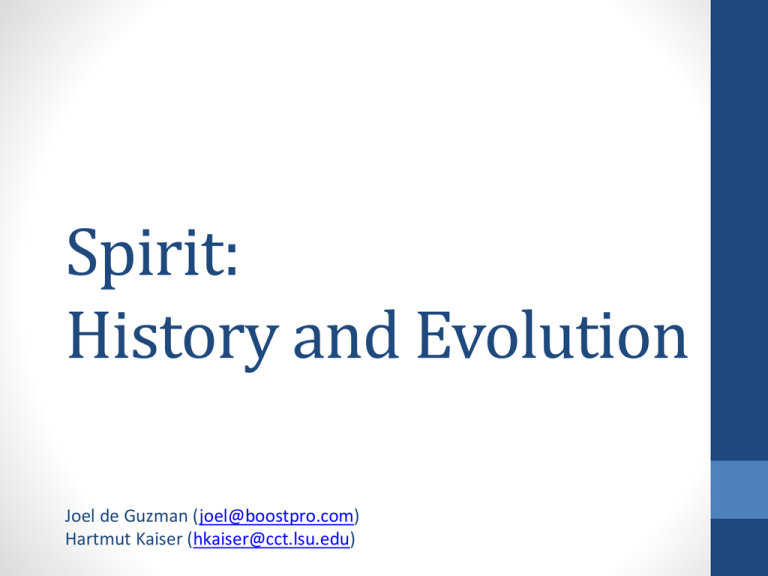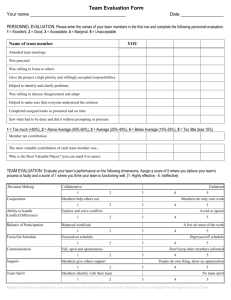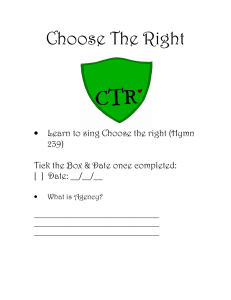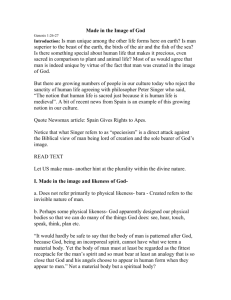
Spirit:
History and Evolution
Joel de Guzman (joel@boostpro.com)
Hartmut Kaiser (hkaiser@cct.lsu.edu)
Spirit: History and Evolution
• 80 - 90s Formative Years
• Pascal, Recursive Descent, Syntax Diagrams
• WWW, Text Based Protocols, Small Languages
• C++
• Dynamic Spirit
• Template Metaprogramming, Generative Programming, Expression Templates
• 2000-2001
• Static Spirit
• Boost Debut
• SourceForge
• 2002
• Phoenix 1.0
• Spirit X
• Spirit Meta Lib
• Spirit Formal Review
• MPL Formal Review
• Lambda Formal Review
BoostCon 2010
Timeline
2
Spirit: History and Evolution
• 2003
• Wave
• Spirit 1.8
• CUJ Article
• Fusion
• 2004-2005
• Spirit 2 Design
• Karma (Tirips)
• Xpressive Formal Review
• Wave Formal Review
• FC++ Formal Review
• Fusion 2
• Phoenix 2
• 2006-2007
• Proto
• Spirit 2 Development
• BoostCon
• Fusion Formal Review
• 2008
• Proto Formal Review
• Phoenix Formal Review
BoostCon 2010
Timeline
3
Library Based
Recursive descent
No separate lexer
Parser objects
• virtual functions (virtual parse member function)
• Fine grained one-shot objects
• Composition of Parser objects
• pointer to base
“Experience shows that software development involves lots of
parsing … Most of the time, without realizing it, we are coding a
parser by hand.”
Spirit: History and Evolution
•
•
•
•
BoostCon 2010
Dynamic Spirit
4
Old Spirit Docs ~2000
grammar
production
: production*;
: ruleID ':' alternative ';';
alternative
difference
xor
intersection
sequence
:
:
:
:
:
iteration
iterator
action
: action { + | iterator };
: '@' { integer } { '..' ( integer | '.' ) };
: basic { ':' actionID };
difference ( [|!# difference )*;
xor ( '-' xor)*;
intersection ( '^' intersection )*;
sequence ( '&' sequence )*;
iteration ( iteration )*;
Spirit: History and Evolution
A snippet of the specification of the parser written in itself following the meta-language:
BoostCon 2010
SEBNF (Spirit EBNF)
5
Recursive descent parser compiler. Dynamically compiles
Extended BNF (EBNF) production rules into a working parser.
The parser acts on the character level and thus obviates
the need for a separate lexical analyzer stage.
The generated parser is a hierarchical structure composed
of Match objects (see Match.hpp). The top-down descent
traverses the hierarchy, checking each object for a match,
back-tracking and checking all possible alternatives. Object
aggregation allows access to any of the step in the recursive
descent. In addition, named semantic actions can be attached
to any level within the hierarchy. These actions are C/C++
functions that will be called if a match is found.
The complete specification and additional documentation is
found in the document parser.doc.
=============================================================================*/
Spirit: History and Evolution
/*=============================================================================
Spirit Class Library
Copyright (c) 1999, 2000, Joel de Guzman
InterXys Inc. All rights reserved.
BoostCon 2010
Match Composition
6
BoostCon 2010
Match Composition
class Match
public:
private:
Match&
};
Match(Match const&);
operator = (Match const&);
//
//
no copy
no assign
Spirit: History and Evolution
virtual
virtual bool
Match();
~Match();
Parse(Scanner& str) const = 0;
7
Return true if both the left and the right match the 'str'.
The 'str' pointer is advanced only if both the left and right
result in a full match.
===============================================================*/
bool AndMatch::Parse(Scanner& str) const
{
Scanner s = str;
if (Left()->Parse(s) && Right()->Parse(s))
{
str = s;
return true;
}
return false;
}
Spirit: History and Evolution
/*===============================================================
AndMatch::Parse(Scanner& str) const
BoostCon 2010
Match Composition
8
• Possible but not efficient
• I need a super efficient Parser kernel
• It must be as efficient as the hand coded parser
• Template Metaprogramming / Expression Templates
• James Coplien.
Curiously Recurring Template Pattern. February
“Awesome. I was looking at it right now...
1995
the work is fabulous man! Be sure to: 1. Post
• Todd Veldhuizen.
Expression
. C++
it to clc++m
2. WriteTemplates
an article on
it forReport,
CUJ.” June 1995
• Geoffrey Furnish. Disambiguated Glommable Expression Templates
Reintroduced. C++ Report. March, 2000
Spirit: History and Evolution
• Hand-coded parser for parsing SEBNF grammars
• Bootstrap! (Write Spirit in Spirit)
BoostCon 2010
Static Spirit
• clc++m
• Andrei Alexandrescu
• Boost
9
Spirit: History and Evolution
template <typename
Derived>function is conceptual, as opposed to virtual, in
The parse member
struct Parser
the sense that the base class parser does not really have any such
{
member function. Subclasses must provide one. The conceptual
/***/ base class is a template class parametized by its subclass, which
gives it access to its subclass. Whenever a parser is asked to do its
task,
it delegates the task to its subclass. This process is very
Derived&
GetDerived()
similar to how virtual functions work, but the difference is that the
{
function is bound statically instead of dynamically (runreturnmember
*static_cast<Derived*>(this);
time bound). James Coplien first popularized this technique of
}
compile-time polymorphism in an article in C++ Report entitled
"Curiously Recurring Template Patterns"
Derived const& GetDerived() const
{
The Spirit Parser Library: Inline Parsing in C++
returnde
*static_cast<Derived
Guzman, Nuffer const*>(this);
}
CUJ Sept 2003
};
BoostCon 2010
Static Spirit CRTP
10
Spirit: History and Evolution
template <typename A, typename B>
struct Sequence : public Binary<A, B>, public Parser<Sequence<A, B> > {
Sequence(A const& a, B const& b) : Binary<A, B>(a, b) {}
template <typename Scanner>
Match
Parse(Scanner& scanner) const
{
Scanner s = scanner;
Match
ma, mb;
if ((ma = SubjectA().Parse(s)) && (mb = SubjectB().Parse(s)))
{
scanner = s;
return ma + mb;
}
return Match();
}
};
BoostCon 2010
Static Spirit
11
Hello there,
Spirit is an object oriented recursive …
I wonder if anyone out there would be interested in such a beast.
If anyones's interested, I'd be very glad to boostify the code
and collaborate with people.
I would appreciate feedback and comments.
Regards,
Joel de Guzman
Spirit: History and Evolution
May 21, 2001
BoostCon 2010
Boost Intro
12
Spirit: History and Evolution
Vesa Karvonen
it can make implementing micro parsers an order of magnitude more
intuitive and simpler compared to traditional methods.
Greg Colvin
I've been wanting to combine Conway's ideas with the Boost regex
library, but given how unlikely I am to have the time I'm happy to see the
Spirit work go forward in Boost.
Hubert HOLIN
Having the ability to code thus within a legitimate C++ fragment would be
invaluable to me.
Douglas Gregor
I think the Spirit C++ parser framework has a clean, readable syntax and that
it could form the basis for a great parsing library. I can envision using Spirit
C++ syntax and having several back-ends that can generate more efficient
parsers, but in-place.
BoostCon 2010
Boost Intro
13
10/16/2001
Hi Joel,
BoostCon 2010
The C Parser
Now I wanted to use Spirit for one of my projects. As an exercise and for getting
some experience with your library I implemented a C grammar checker which
wasn't so difficult :-) as I thought. The main problems I faced where the need for
left recursion free rules and special needs for not matching the shortest possible
rules.
Is there any interest in adding this parser as a sample to your library?
BTW I'm using the Intel V5.0.1 compiler with STLPort 4.5 on W2K and there was
only one minor change required to compile my parser successfully.
Thanks and regards
Hartmut Kaiser
Spirit: History and Evolution
I'm very interested in Spirit since the very first steps of Spirit on the boost list some
time ago.
14
void push(char const* str, char const* end)
{
my_vec.push_back(std::strtol(str, NULL, 10));
}
Spirit: History and Evolution
• Transduction Parsing
• Semantic actions
BoostCon 2010
Semantic Expressions
15
void push(char const* str, char const* end)
{
my_vec.push_back(std::strtol(str, NULL, 10));
}
• ASTs
• Dan Nuffer
• Attributes
• int_p int attribute
void push(int attr)
{
my_vec.push_back(attr);
}
Spirit: History and Evolution
• Transduction Parsing
• Semantic actions
BoostCon 2010
Semantic Expressions
16
term
=
factor[term.val = arg1]
>> *(
('*' >> factor[term.val *= arg1])
|
('/' >> factor[term.val /= arg1])
)
;
factor
=
|
|
|
;
ureal_p[factor.val = arg1]
'(' >> expression[factor.val = arg1] >> ')'
('-' >> factor[factor.val = -arg1])
('+' >> factor[factor.val = arg1])
Spirit: History and Evolution
expression
=
term[expression.val = arg1]
>> *(
('+' >> term[expression.val += arg1])
|
('-' >> term[expression.val -= arg1])
)
;
BoostCon 2010
Semantic Expressions
17
• E.g.
int_p[assign_a(x)]
• There was a whole set of “predefined” actions out of the box.
• Development began with SpiritX
• SpiritX will allow inline “Semantic Expressions”
• E.g
int_p[var(x) = arg1]
• Hence became the SE framework (Semantic Expressions
Framework)
• Arguments were always const
• Supports only 3 arguments (Spirit requires only two)
• SE was generalized and decoupled from Spirit and later
became known as Phoenix
Spirit: History and Evolution
• Spirit 1.0 had offline semantic actions
BoostCon 2010
Semantic Expressions
18
• list_p, confix_p, comment_p
BoostCon 2010
Spirit-Meta
Spirit: History and Evolution
• FIXME!
19
expr = add[expr.val = arg1];
add =
group_d[mul >> '+' >> mul
[
add.val = arg1 + arg3
]
| group_d[mul >> '-' >> mul
[
adds.val = arg1 - arg3
]
;
mul =
group_d[fact
[mul.val =
| group_d[fact
[mul.val =
| fact[mul.val
;
>> '*' >> fact]
arg1 * arg3]
>> '/' >> fact]
arg1 / arg3]
= arg1]
fact =
ureal_p[fact.val = arg1]
| '('
>> add[fact.val = arg1
>> ')'
| '-' >> add[fact.val = -arg1]
| '+' >> add[fact.val = arg1]
;
Spirit: History and Evolution
Spirit mailing list, 2002-10-09,
The grouping parser:
BoostCon 2010
Spirit-Meta
20
The grouped_parser template is the real workhorse behind the group_d parsers,
generated if the parser to group is a binary parser.
The main work this template does, is to attach a special actor as a
semantic action recursively to all leaf parsers of the original binary
parser. This is done by the help of the post_order parser traversal
algorithm. So during the parsing process every leaf parser calls the
corresponding operator() functions of its respective actor, providing it
with its parser result.
The attached actors are constructed such, that they assign the parser
result values to the corresponding member of the overall result tuple.
The correct tuple member number is computed during the post_order parser
traversal process such, that the leaf parsers are numbered from left to
right. Such the most left leaf parser result is accessible as 'arg1' inside
the sematic action code attached to the grouped parser, the second leaf
parser result is accessible 'arg2' and so on.
After a successful match this tuple value is fed into the usual
Spirit semantic action mechanics and the tuple members are available from
inside the semantic action code attached to the grouped parser.
Spirit: History and Evolution
//
//
//
//
//
//
//
//
//
//
//
//
//
//
//
//
//
//
//
//
//
//
BoostCon 2010
Spirit-Meta
21
• Traversal of parser expressions
template <typename TransformT, typename TupleT>
struct group_transform_policies
: public group_transform_plain_policy<TransformT, TupleT>,
public unary_identity_policy<TransformT>,
public action_identity_policy<TransformT>,
public binary_identity_policy<TransformT>
{
group_transform_policies(TupleT &tuple_)
: group_transform_plain_policy<
TransformT, TupleT>(tuple_)
{}
};
Spirit: History and Evolution
• Transformation of parser expressions
BoostCon 2010
Spirit-Meta
• Reconstruct a different parser based on context, if needed
• Each parser needed corresponding parser factory template allowing
to reconstruct the original parser component
22
Spirit: History and Evolution
Ready
Get set
BoostCon 2010
Boost Formal Review!!!
Need I say more?
23
Spirit: History and Evolution
• A year after Spirit’s initial Boost introduction (May 2001 –
October 2002), hard work paid off
• Spirit was accepted into Boost
• Review manager: John Maddock
• Participants: Aleksey Gurtovoy, Andre Hentz, Beman
Dawes, Carl Daniel, Christopher Currie, Dan Gohman,
Dan Nuffer, Daryle Walker, David Abrahams, David B.
Held, Dirk Gerrits, Douglas Gregor, Hartmut Kaiser, Iain
K.Hanson, Juan Carlos Arevalo-Baeza, Larry Evans, Martin
Wille, Mattias Flodin, Noah Stein, Nuno Lucas, Peter
Dimov, Peter Simons, Petr Kocmid, Ross Smith, Scott
Kirkwood, Steve Cleary, Thorsten Ottosen, Tom Wenisch,
Vladimir Prus
BoostCon 2010
Boost Formal Review
24
• Started in 2001 as an experiment in how far Spirit could be taken
• Initially it was not meant to be high performance
• Merely a experimental platform
• Almost no Standards conformant preprocessor available
• First full rewrite in 2003
• Implemented macro namespaces which lead to some discussions in
the C++ committee (removed now)
• Macro expansion trace, which is still a unique feature
• First official announcement of Wave on Boost list: 3/8/2003
Spirit: History and Evolution
• Wave is a Standards conformant implementation of the mandated
C99/C++98 preprocessor functionality
• Generates sequence of C99/C++ tokens exposed by an iterator
interface
BoostCon 2010
Wave
25
• At this time one of the 2 available fully conformant preprocessors
(gcc is the other)
• Got a comprehensive regression test suite with over 400
single unit tests
• Continuous improvement and development
• Based on user feedback
• A lot of improvements since then
• Performance now on par with commercial preprocessors (but still
slower than gcc or clang)
• Usability improvements helping to use Wave as a library
Spirit: History and Evolution
• In Boost since 2005 (V1.33.0)
BoostCon 2010
Wave: Some More History
26
• Using this template is very demanding in terms of compile time
• Wave needed 30 minutes to compile on Intel C++ V5
• Difficult to decouple as it pulls a lot of other templated stuff
Spirit: History and Evolution
// header some_huge_template.hpp
template <typename T>
struct some_huge_template
{
some_huge_template() {/* implementation */}
// ...
};
BoostCon 2010
Explicit Template Instantiation
27
// header some_huge_template_impl.hpp
template <typename T>
some_huge_template<T>::some_huge_template() {/* implementation */}
// source file some_huge_template_string.cpp
#include "some_huge_template.hpp"
#include "some_huge_template_impl.hpp"
template some_huge_template<std::string>;
Spirit: History and Evolution
// header some_huge_template.hpp
template <typename T>
struct some_huge_template
{
some_huge_template();
// function declarations only
};
BoostCon 2010
Explicit Template Instantiation
28
• Synopsis
• A Source-code Introspection Tool (http://synopsis.fresco.org/)
BoostCon 2010
Wave: Known Applications
• ROSE
• Zoltán Porkoláb
• Debugger for C++ Templates
• Hannibal
• partial C++ parser using Spirit
• Wave tool
• Full blown preprocessor
• If you know more, please drop me a note
Spirit: History and Evolution
• A Tool for Building Source-to-Source Translators
(http://rosecompiler.org/)
29
• “Wave is a great tool that is getting better every day.” (Paul
Mensonides)
• “And then there is always Wave (if I haven't mentioned it yet, I am
really excited about this work!).” (Aleksey Gurtovoy)
• “Congratulations! This is huge!” (Eric Niebler)
• Paul Mensonides: “I say Chaos!”
• Strict pp lib: 2/27/2003
• Chaos-PP: 4/10/2003 (first mentioned)
Spirit: History and Evolution
• First official announcement of Wave on Boost list: Sat 3/8/2003
BoostCon 2010
Wave: Boost Intro
• Vesa Karvonen: “I say Order!”
• PP Beta reducer: 4/11/2003
• Order-PP: 4/27/2003
30
BACK TO SPIRIT
31
Spirit: History and Evolution
BoostCon 2010
• Spirit synthesized attributes for primitive parsers
• int_p
• symbol_p
BoostCon 2010
Attribute Grammars
• a >> b
• a|b
• This Presents an awkward situation
• int x, y;
• int_p[var(x) = arg1 // OK
• (int_p >> int_p)[var(x) = arg1, var(y) = arg2 // No good
• We need tuples, but tuples ain’t enough
• We need a library like MPL that can deal with values
• Heterogeneous data structures
• Algorithms on heterogeneous data structures
A Framework for RAD Spirit
• Everything else uses transduction
32
• Challenge:
• (a >> b >> c)[ var(x) = arg1, var(y) = arg2, var(z) = arg3 ]
BoostCon 2010
Attribute Grammars
• Walk both the ET tree and the attribute tuple
• How?
• flatten the ET tree ET sequence
• Walk the ET and attribute sequences in parallel
• Data structures:
• ET sequence [A, B, C]
• Attribute Sequence: [X, Y, Z]
• Algorithm: bool any(et, attr, pred)
A Framework for RAD Spirit
• Solution:
• pred: return true if “any” of et fails (to parse)
• Fusion!
33
• Based on MPL and seminal work by Doug Gregor
• Bridges the gap between compile time (MPL) and runtime
(STL) using similar concepts (sequences, iterators and
algorithms)
• Just the perfect infrastructure for Phoenix2 and Spirit2
• Both are rewrites extensively using Fusion
• Accepted into Boost in May 2006
A Framework for RAD Spirit
• Initially developed as a proof of concept in 2002
BoostCon 2010
Fusion
34
• The architecture is modeled after MPL which in turn is
modeled after STL. It is named "fusion" because the library is a
"fusion" of compile time metaprogramming with runtime
programming.
A Framework for RAD Spirit
• Fusion is a library for working with heterogenous collections
of data, commonly referred to as tuples. A set of containers
(vector, list, set and map) is provided, along with views that
provide a transformed presentation of their underlying data.
Collectively the containers and views are referred to as
sequences, and Fusion has a suite of algorithms that operate
upon the various sequence types, using an iterator concept
that binds everything together.
BoostCon 2010
Fusion
35
• Bind / Lambda / Phoenix
• Expressive
• Spirit
• Qi
• Karma
• ETs Unite!
• Let all ye _1 and _2 be unified
• Proto
A Framework for RAD Spirit
• A plethora of ETs
BoostCon 2010
ET Invasion
36
• Never again shall we write yet another operator overload
• Never again shall we write an “inordinate amount of unreadable
and un-maintainable template
mumbo-jumbo.”
• Best of all, all our minilanguages seamlessly interoperate. Case in point: Qi and
Karma
A Framework for RAD Spirit
• Proto is a framework for building Domain Specific Embedded
Languages in C++. It provides tools for constructing, typechecking, transforming and executing expression templates
• Boost.Proto eases the development of domain-specific
embedded languages (DSELs)
BoostCon 2010
Proto
37
A Framework for RAD Spirit
• April 20, 2005: Proto is born as a major refactorization of Boost.Xpressive
• October 28, 2006: Proto is reborn, this time with a uniform expression types
that are POD.
• November 1, 2006: The idea for proto::matches<> and the whole grammar
facility is hatched during a discussion with Hartmut Kaiser on the spiritdevel list.
• December 11, 2006: The idea for transforms that decorate grammar rules is
born in a private email discussion with Joel de Guzman and Hartmut Kaiser.
• April 4, 2007: Preliminary submission of Proto to Boost.
• April 15, 2007: Boost.Xpressive is ported from Proto compilers to Proto
transforms. Support for old Proto compilers is dropped.
• January 11, 2008: Boost.Proto v3 brings separation of grammars and
transforms and a "round" lambda syntax for defining transforms in-place.
• March 1, 2008: Proto's Boost review begins.
• April 7, 2008: Proto is accepted into Boost.
BoostCon 2010
Proto
38
• Inspired by StringTemplate library (part of ANTLR)
Tirips is a library for flexible generation of arbitrary character
or token sequences. It's very similar to the Spirit parser
library in the sense, that it uses a 'grammar' describing the
structure of the expected output. It is based on the idea, that
a grammar used for parsing of a certain input sequence may
be used to regenerate this input sequence as well.
• First implementation late 2004, since then developed in sync with
the parser library
• Named Karma in early 2005, which prompted the name Qi for the
parser part
Spirit: History and Evolution
• First ideas: mid 2004
BoostCon 2010
Tirips, or Spirit spelled backwards
39
• “Yang to Qi’s Yin” (Eric Niebler)
• A versatile tools for almost everything from straight output of
primitive data items to creating formatted output for complex
data structures
• Why use a tool like Karma for generating output?
• The more complex the output requirements are the more difficult
it is to write maintainable code
• Karma is fast!
• Karma is header only, same as whole Spirit
Spirit: History and Evolution
• Today a symmetric part of Spirit
BoostCon 2010
Karma: Generating Output
40
• Wave developed techniques to integrate a lexer with Spirit
• Lexertl: Ben Hansons excellent lexer engine
• It is a lexical analyser generator inspired by flex.
• The aim is to support all the features of flex, whilst providing a
more modern interface and supporting wide characters.
• Much faster than flex
• Proposed for Boost review
• Spirit.Lex is just a wrapper
Spirit: History and Evolution
• We have been discussing this on and off
BoostCon 2010
Finally: A Lexer
41
•
•
•
•
•
•
•
•
•
•
•
•
•
•
Eric Niebler for writing Boost.Proto, without which this rewrite wouldn't have been possible, and helping with examples,
advices, and suggestions on how to use Boost.Proto in the best possible way.
Ben Hanson for providing us with an early version of his Lexertl library, which is proposed to be included into Boost (as
Boost.Lexer). At the time of this writing the Boost review for this library is still pending.
Francois Barel for his silent but steady work on making and keeping Spirit compatible with all versions of gcc, older and
newest ones. He not only contributed subrules to Spirit V2.1, but always keeps an eye on the small details which are so
important to make a difference.
Andreas Haberstroh for proof reading the documentation and fixing those non-native-speaker-quirks we managed to
introduce into the first versions of the documentation.
Chris Hoeppler for taking up the editorial tasks for the initial version of this documentation together with Andreas
Haberstroh. Chris did a lot especially at the last minute when we are about to release.
Michael Caisse also for last minute editing work on the 2.1 release documentation.
Tobias Schwinger for proposing expectation points and GCC port of an early version.
Dave Abrahams as always, for countless advice and help on C++, library development, interfaces, usability and ease of use,
for reviewing the code and providing valuable feedback and for always keeping us on our toes.
OvermindDL for his creative ideas on the mailing list helping to resolve even more difficult user problems.
Carl Barron for his early adoption and valuable feedback on the Lexer library forcing us to design a proper API covering all of
his use cases. He also contributed an early version of the variadic attribute API for Qi.
Daniel James for improving and maintaining Quickbook, the tool we use for this documentation. Also, for bits and pieces
here and there such documentation suggestions and editorial patches.
Stephan Menzel for his early adoption of Qi and Karma and his willingness to invest time to spot bugs which were hard to
isolate. Also, for his feedback on the documentation.
Ray Burkholder and Dainis Polis for last minute feedback on the documentation.
Steve Brandt for his effort trying to put Qi and Karma to some use while writing a source to source language transformation
Spirit: History and Evolution
This version of Spirit is a complete rewrite of the Classic Spirit many people have been contributing to (see below). But there are
a couple of people who already managed to help significantly during this rewrite. We would like to express our special
acknowledgement to:
BoostCon 2010
Acknowledgements
42
Spirit: History and Evolution
BoostCon 2010
Thank You!
43








